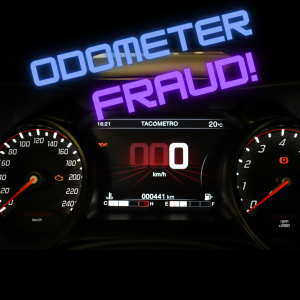
Things gained through unjust fraud are never secure. – Sophocles
Vehicle Title History. When considering purchasing a vehicle obtain an inexpensive summary of the vehicle’s title history from the National Motor Vehicle Title Information System, Carfax, and/or AutoCheck; it may show odometer discrepancies. However, don’t rely solely on title history summaries, for they do not always identify a vehicle’s problems. That said, is a quick and cheap first step.
Review mileage reported on Inspection Stickers. Look at the mileage indicated on repair or inspection stickers found on the driver’s door frame. The absence of these stickers where they should be found is suspicious.
Look for Papers in the glove compartment. You may find repair bills, service records, or other documents indicating prior vehicle mileage and other helpful information. Ask the seller for repair paperwork as well.
Inspect Tire Wear. For vehicles with claimed low mileage (under 25,000) inspect the tire wear to determine if the tires are too worn or not worn enough to match the vehicle’s mileage. If they are original tires, the tire manufacture date should be close to the vehicle manufacture date. You may be able to research online or ask a tire shop to decipher the tire manufacture date from the code found on the tire’s sidewall.
Ask an authorized dealer for help. Manufacturers keep warranty repair information on a vehicle, including odometer information. A franchised dealer may be able to access this information for you. Taking the vehicle in for repair at a franchised dealer may also lead the dealer to inform the consumer of an odometer discrepancy.
Vehicle Inspection. A physical inspection of the vehicle can uncover an overall condition not matching the mileage on the odometer or indicating odometer tampering. The leftmost digit may not line up with the others, the case may be scratched, white lines may appear between the odometer numbers, the odometer may record mileage inaccurately, or screws holding the dashboard may have been replaced. An electronic odometer having strange read-outs is a good indicator of odometer tampering.
Additional Tips. There may be a computer chip in the vehicle that measures mileage independently of the dashboard odometer so that a comparison can uncover an odometer rollback. If anything looks suspicious, obtain a detailed title history from each state’s department of motor vehicles wherever the vehicle was registered as listed in the title history (see point number one, above). A state motor vehicle title history may also provide contact information for prior owners who can provide details about the vehicle history. It is also useful to compare the nature (fleet vehicle v. private owner) of a vehicle’s prior owners with the dealer’s representations as to their nature.
Laws that Apply to Odometer Fraud
The Motor Vehicle Information and Cost Savings Act (sometimes known as the Federal Odometer Act, provides for $10,000 minimum damages, treble damages, and attorney fees for odometer tampering, mis-disclosure of information on vehicle title documents, certain oral misrepresentations, or conspiracy involving Act violations. While the intent is required for Act violations, there is a relaxed intent standard when a used car dealer engages in title disclosure or other Act violations. Effective January 1, 2020, the ten-year exemption for older vehicles is replaced with a twenty-year exemption. 2009 model-year vehicles and older are grandfathered as exempt. With the new regulation, vehicles with a 2010 model year or later are only exempt after 20 years. Thus 2010 model-year cars will not be exempt from the title disclosure requirements until 2030. There are also state laws that cover odometer fraud; for more information about odometer fraud here is a link on the National Highway Traffic Safety Administration’s website to each state agency enforcing odometer fraud laws: https://www.nhtsa.gov/odometer-fraud/state-enforcement-agencies-odometer-fraud.
The information provided does not and is not intended to, constitute legal advice. All information is for general informational purposes only. This information may not constitute the most up-to-date information. The links provided are only for the convenience of the reader, A. Ferraris Law, PLLC and its members do not endorse the contents of the third-party references.
Copyright©2022, A. Ferraris Law, PLLC. All Rights Reserved







